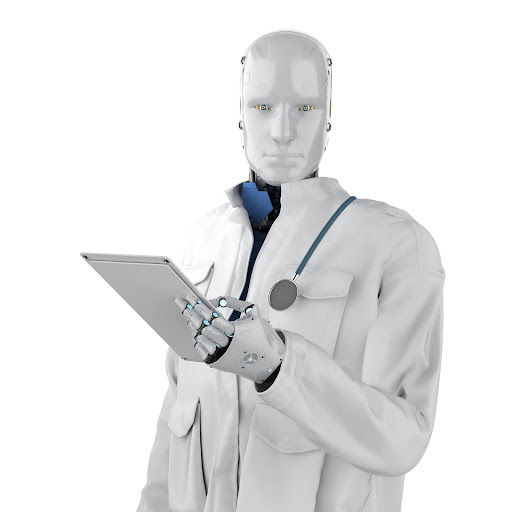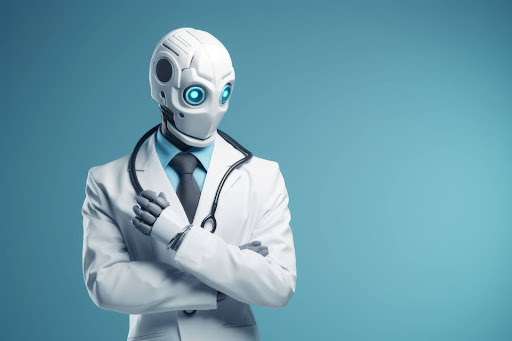Why Am I So Tired? Common Causes Explained
Understanding Fatigue: More Than Just Feeling SleepyFeeling tired is something everyone experiences, but when fatigue lingers or worsens, it becomes a signal worth paying [...]
Read More
Medically reviewed by Alan Lucks | MD, Alan Lucks MDPC Private Practice - New York on June 17th, 2025.
In the rapidly evolving landscape of artificial intelligence, AI systems' capabilities have expanded far beyond simple tasks.
One intriguing application is the ability of AI to generate medical documentation, including doctors' notes. This article explores the mechanisms behind AI doctors' notes, the potential benefits, and the ethical considerations involved.
 The Mechanics of AI in Medical Documentation
The Mechanics of AI in Medical DocumentationUnderstanding how AI can produce a doctor's note requires studying natural language processing (NLP) and machine learning.
These technologies enable AI to interpret, generate, and even understand human language, making it possible to create coherent and contextually appropriate medical documents.
NLP is a branch of AI that focuses on the interaction between computers and humans through natural language. It allows machines to read, interpret, and generate text in a way that is meaningful to humans.
In the context of medical documentation, NLP algorithms can analyze patient data, clinical notes, and even research papers to extract relevant information.
This capability is essential for generating accurate and relevant doctors' notes. By processing large amounts of medical data, AI can identify key symptoms, diagnoses, and treatment plans that should be included in a doctor's note.
Furthermore, NLP can also assist in deciphering unstructured data, such as free-text notes written by healthcare providers, which often contain valuable insights that structured data might miss.
By converting this unstructured information into a usable format, AI enhances the quality and comprehensiveness of medical documentation.
Machine learning, a subset of AI, involves training algorithms on large datasets to recognize patterns and make predictions.
In healthcare, these models can be trained on historical patient records and outcomes, allowing them to generate notes that reflect best practices and current medical standards.
For instance, a machine learning model can be trained to recognize the typical structure of a doctor's note, including sections for patient information, symptoms, diagnosis, and recommendations.
Once trained, the AI can produce notes that adhere to these structures, ensuring consistency and clarity. Additionally, machine learning can adapt over time; as more data becomes available, these models can refine their predictions and improve their accuracy.
This adaptability is particularly important in the medical field, where guidelines and best practices are constantly evolving, ensuring that AI-generated documentation remains relevant and up-to-date.
The integration of AI into medical documentation offers numerous advantages, including enhanced patient care and administrative efficiency.
One of the most significant benefits of AI-generated doctors' notes is the time saved for healthcare professionals.
Writing detailed notes can be a time-consuming task, often taking away from patient care. AI can automate this process, allowing doctors to focus more on direct patient interaction.
Streamlined Workflow: AI can quickly generate notes based on input data, reducing the administrative burden on healthcare providers.
Consistency: AI ensures that notes are consistently formatted and contain all necessary information, minimizing the risk of errors.
AI-generated notes can enhance the accuracy of medical documentation. By relying on data-driven insights, AI can help reduce human errors that may occur during manual note-taking.
Moreover, AI systems can continuously learn from new data, adapting to changes in medical guidelines and practices. This ensures that the generated notes are not only accurate but also up-to-date with the latest medical standards.
In addition to improving accuracy, AI can analyze vast amounts of patient data to identify patterns and trends that may not be immediately apparent to healthcare providers.
For instance, by examining a patient's history, AI can highlight potential risk factors or suggest preventive measures that enhance patient outcomes. This analytical capability can empower doctors to make more informed decisions, ultimately leading to better health management.
Furthermore, AI-generated notes can facilitate better communication among healthcare teams. When notes are standardized and easily accessible, it becomes simpler for different specialists to collaborate on a patient's care.
This interconnectedness can lead to a more holistic approach to treatment, as all providers are on the same page regarding the patient's condition and treatment plan.
Such collaboration is particularly crucial in complex cases involving multiple disciplines, ensuring that every aspect of a patient's health is comprehensively addressed.
 Challenges and Limitations
Challenges and LimitationsDespite the advantages, there are challenges and limitations to consider when using AI to generate doctors' notes.
Medical data is highly sensitive, and the use of AI in generating doctors' notes raises significant privacy concerns. Ensuring the confidentiality of patient information is paramount, and any AI system must comply with healthcare regulations such as HIPAA.
Healthcare providers must implement robust security measures to protect patient data from unauthorized access. This includes using encryption, secure data storage, and regular audits of AI systems to ensure compliance with privacy standards.
Moreover, it is essential to educate healthcare staff about the importance of data privacy and the potential risks associated with AI systems, fostering a culture of vigilance and responsibility in handling sensitive information.
While AI can generate notes quickly, the quality of these notes must be monitored. There is a risk that AI-generated content may not always reflect the nuances of individual patient cases.
Healthcare providers should establish protocols for reviewing AI-generated notes to ensure they meet clinical standards. Regular training and updates to the AI models can also help improve the quality of the generated documentation.
Additionally, incorporating feedback from healthcare professionals who interact with the AI can provide valuable insights into areas for improvement, ensuring that the AI evolves in alignment with real-world clinical practices.
This collaborative approach not only enhances the accuracy of the notes but also builds trust among practitioners who may be hesitant to rely on automated systems for critical documentation.
The use of AI in healthcare raises important ethical questions that need to be addressed as technology continues to advance.
One of the primary ethical concerns is accountability. If an AI system generates a doctor's note that leads to a misdiagnosis or inappropriate treatment, who is responsible? The healthcare provider, the AI developer, or the institution using the AI?
Establishing clear guidelines regarding accountability is crucial. Healthcare organizations must define the roles and responsibilities of AI systems and their human counterparts to ensure patient safety and trust in AI technologies.
Furthermore, there should be a framework for reporting and addressing errors that arise from AI interactions.
This could include a system for documenting incidents where AI recommendations lead to adverse outcomes, allowing for a transparent review process that can inform future improvements in both AI and clinical practices.
AI systems can inadvertently perpetuate biases present in the training data. If the data used to train an AI model is skewed or unrepresentative, the generated notes may reflect these biases, potentially leading to disparities in patient care.
To mitigate this risk, it is essential to use diverse and representative datasets when training AI models. Continuous monitoring and evaluation of AI outputs can help identify and rectify any biases that may arise.
Additionally, involving a multidisciplinary team—including ethicists, data scientists, and healthcare professionals—in the development and deployment of AI systems can provide a more holistic view of potential biases and their implications.
This collaborative approach can foster an environment where ethical considerations are prioritized, and the resulting AI tools are better equipped to serve all patient populations equitably.
AI-generated doctor's notes can be applied in various healthcare settings, enhancing efficiency and improving patient outcomes.
With the rise of telemedicine, AI-generated doctors' notes can play a crucial role in documenting remote consultations.
As healthcare providers conduct virtual visits, AI can assist in creating comprehensive notes based on the conversation and any diagnostic data shared during the session.
This not only streamlines the documentation process but also ensures that patients receive accurate records of their virtual visits, which can be essential for follow-up care.
Additionally, the integration of AI in telemedicine can facilitate better communication between patients and providers, as the generated notes can highlight key points discussed during the consultation, ensuring that both parties are aligned on treatment plans and next steps.
In emergency situations, time is of the essence. AI can quickly generate notes based on initial assessments and vital signs, allowing healthcare providers to focus on immediate patient care.
By automating the documentation process, AI can help ensure that critical information is captured accurately and efficiently, which is vital for effective treatment in emergency settings.
Moreover, AI-generated notes can be programmed to flag any abnormalities or urgent concerns, prompting healthcare professionals to prioritize specific interventions.
This capability enhances the speed of care and contributes to better outcomes, as it allows for rapid decision-making based on comprehensive data analysis in high-pressure situations.
The future of AI in medical documentation is promising, with several trends likely to shape its evolution.
As healthcare systems increasingly adopt electronic health records, the integration of AI-generated notes with EHR systems will become more prevalent. This integration can enhance data accessibility and streamline workflows for healthcare providers.
By automatically populating EHRs with AI-generated notes, healthcare professionals can ensure that patient records are comprehensive and up-to-date, facilitating better communication and coordination of care.
Moreover, this integration can significantly reduce healthcare providers' administrative burden, allowing them to focus more on patient care rather than paperwork.
With AI handling the documentation, clinicians can spend more time interacting with patients, leading to improved patient outcomes.
Furthermore, the ability to quickly access AI-generated insights from patient data can assist in making informed clinical decisions, ultimately enhancing the quality of care delivered.
Future AI systems are expected to leverage advanced algorithms to provide more personalized doctor's notes. By analyzing individual patient data, AI can generate notes that reflect the specific needs and circumstances of each patient.
This level of personalization can improve patient engagement and satisfaction, as patients receive documentation that is tailored to their unique health situations.
In addition to improving patient experience, personalized documentation can also play a crucial role in chronic disease management.
For instance, AI can identify trends in a patient's health data over time and generate notes that highlight important changes or suggest modifications in treatment plans.
This proactive approach not only empowers patients to take charge of their health but also enables healthcare providers to deliver more precise and effective interventions, ultimately fostering a more collaborative healthcare environment.
The potential for AI to generate doctors' notes represents a significant advancement in the healthcare industry. While there are challenges and ethical considerations to address, the benefits of improved efficiency, accuracy, and personalization are compelling.
Doctronic is at the forefront of this shift, using AI to streamline medical documentation and support better patient outcomes. As technology evolves, the integration of AI in healthcare is likely to become standard practice, enhancing both care quality and operational efficiency.
While AI can effectively generate medical documentation and reduce physician workload by up to 50%, healthcare systems must implement robust oversight protocols and ensure regulatory compliance before adoption. The technology shows promise but requires careful validation and human supervision to maintain accuracy and patient safety. If you have questions about AI in healthcare documentation, Doctronic can provide personalized guidance.
Understanding Fatigue: More Than Just Feeling SleepyFeeling tired is something everyone experiences, but when fatigue lingers or worsens, it becomes a signal worth paying [...]
Read MoreUnderstanding Cold Symptoms and Treatment GoalsWhen a cold hits, it often brings a mix of symptoms such as a runny nose, sore throat, cough, congestion, and sometimes a mild [...]
Read MoreUnderstanding Delsym: What It Is and How It WorksDelsym is a popular cough syrup that suppresses coughing for up to 12 hours. Its main ingredient, Dextromethorphan, targets [...]
Read More